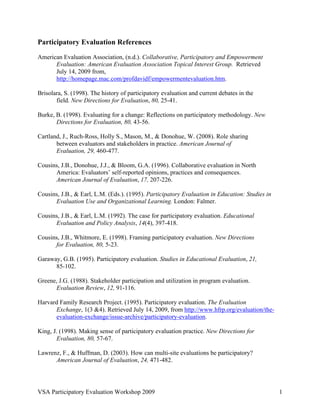
Empowering youth to be evaluators: Involving Young People in Evaluating Informal Education Programs, Reference List
- 1. Participatory Evaluation References American Evaluation Association, (n.d.). Collaborative, Participatory and Empowerment Evaluation: American Evaluation Association Topical Interest Group. Retrieved July 14, 2009 from, http://homepage.mac.com/profdavidf/empowermentevaluation.htm. Brisolara, S. (1998). The history of participatory evaluation and current debates in the field. New Directions for Evaluation, 80, 25-41. Burke, B. (1998). Evaluating for a change: Reflections on participatory methodology. New Directions for Evaluation, 80, 43-56. Cartland, J., Ruch-Ross, Holly S., Mason, M., & Donohue, W. (2008). Role sharing between evaluators and stakeholders in practice. American Journal of Evaluation, 29, 460-477. Cousins, J.B., Donohue, J.J., & Bloom, G.A. (1996). Collaborative evaluation in North America: Evaluators’ self-reported opinions, practices and consequences. American Journal of Evaluation, 17, 207-226. Cousins, J.B., & Earl, L.M. (Eds.). (1995). Participatory Evaluation in Education: Studies in Evaluation Use and Organizational Learning. London: Falmer. Cousins, J.B., & Earl, L.M. (1992). The case for participatory evaluation. Educational Evaluation and Policy Analysis, 14(4), 397-418. Cousins, J.B., Whitmore, E. (1998). Framing participatory evaluation. New Directions for Evaluation, 80, 5-23. Garaway, G.B. (1995). Participatory evaluation. Studies in Educational Evaluation, 21, 85-102. Greene, J.G. (1988). Stakeholder participation and utilization in program evaluation. Evaluation Review, 12, 91-116. Harvard Family Research Project. (1995). Participatory evaluation. The Evaluation Exchange, 1(3 &4). Retrieved July 14, 2009, from http://www.hfrp.org/evaluation/the- evaluation-exchange/issue-archive/participatory-evaluation. King, J. (1998). Making sense of participatory evaluation practice. New Directions for Evaluation, 80, 57-67. Lawrenz, F., & Huffman, D. (2003). How can multi-site evaluations be participatory? American Journal of Evaluation, 24, 471-482. VSA Participatory Evaluation Workshop 2009 1
- 2. McCabe, A., & Horsley, K. (2008). The Evaluator’s Cookbook. New York, NY: Routledge. Patton, M.Q. (2008). Utilization-Focused Evaluation (4th ed.). Los Angeles, CA: Sage Publications, Inc. Ryan, K., Greene, J., Lincoln, Y., Mathison, S., & Mertens, D.M. (1998). Advantages and challenges of using inclusive evaluation approaches in evaluation practice. American Journal of Evaluation, 19, 101-122. Ryan, K., & Schwandt, T. (Eds.). (2002). Exploring Evaluator Role and Identity. Greenwich, CT: Information Age Publishing. Smits, P.A., & Champagne, F. (2008). An assessment of the theoretical underpinnings of practical participatory evaluation. American Journal of Evaluation, 29(4), 427-442. Weaver, L., & Cousins, J.B. (2004). Unpacking the participatory process. Journal of MultiDisciplinary Evaluation. 1(1), 19-40. Youth Participatory Evaluation Checkoway, B., Dobbie, D., & Richards-Schuster, K. (2003). Involving young people in community evaluation research. Community Youth Development Journal, 4(1). Retrieved July 14, 2009, from www.cydjournal.org/2003Spring/checkoway.html. Checkoway, B., & Richards-Schuster, K. (2004). Participatory Evaluation with Young People. Ann Arbor, MI: University of Michigan. Flores, K. (2009). Youth Participatory Evaluation: Creating the Field Together NING Site. Retrieved July 14, 2009 from, http://youthparticipatoryeval.ning.com/. Harvard Family Research Project. (2002). Youth involvement in evaluation and research. Issues and Opportunities in Out-of-School Time Evaluation, 1, 1-8. Lau, G., Netherland, N.H., & Haywood, M.L. (2003). Collaboration on evaluation for youth development. New Directions for Evaluation, 98, 47-59. London, J.K., Zimmerman, K., & Erbstein, N. (2003). Youth-led research and evaluation: Tools for youth, organizational, and community development. New Directions for Evaluation, 98, 33-45. Sabo Flores, K. (2008) Youth Participation Evaluation: Strategies for Engaging Young People. San Francisco, CA: Jossey-Bass. VSA Participatory Evaluation Workshop 2009 2